|
|
|
Sort Order |
|
|
|
Items / Page
|
|
|
|
|
|
|
| Srl | Item |
| 1 |
ID:
184136
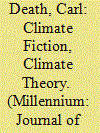

|
|
|
|
|
| Summary/Abstract |
The international politics of climate change invokes the imagination of various potential global futures, ranging from techno-optimist visions of ecological modernisation to apocalyptic nightmares of climate chaos. This article argues that most dominant framings of the future in climate policy imaginaries tend to be depoliticised and linear visions of universal, homogenous time, with little spatio-temporal or ecological plurality. This article aims to convince IR scholars of climate politics that Africanfuturist climate fiction novels can contribute to the decolonisation of climate politics through radically different socio-climatic imaginaries to those that dominate mainstream imaginations of climate futures. The Africanfuturist climate fiction novels of authors such as Nnedi Okorafor, Lauren Beukes and Doris Lessing imagine different spaces, temporalities, ecologies and politics. Reading them as climate theory, they offer the possibility of a more decolonised climate politics, in which issues of land and climate justice, loss and damage, extractive political economies and the racialised and gendered violence of capitalism are central.
|
|
|
|
|
|
|
|
|
|
|
|
|
|
|
|
| 2 |
ID:
142209
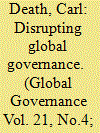

|
|
|
|
|
| Summary/Abstract |
Disruptive protest by nonstate actors often accompanies global governance conferences, but little analysis has been devoted to disaggregating its diverse forms. This article identifies four types of disruptive protest— symbolic, procedural, coercive, and evasive—and illustrates them with examples from UN environmental conferences in Stockholm (1972), Rio de Janeiro (1992), Johannesburg (2002), and Rio de Janeiro (2012). Symbolic disruption in Stockholm contributed to the production of new discourses; procedural disruption in Rio in 1992 introduced new actors and texts; some protestors sought to directly and coercively disrupt the summit in Johannesburg; and protests in Rio in 2012 illustrate disruption through evasion and exit. Understanding the form and power of such disruptive protests is crucial for studies of global governance.
|
|
|
|
|
|
|
|
|
|
|
|
|
|
|
|
| 3 |
ID:
142655
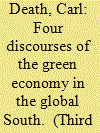

|
|
|
|
|
| Summary/Abstract |
This article identifies four contrasting global discourses of the green economy in contemporary usage: green resilience, green growth, green transformation and green revolution. These four discourses are manifested in recent green economy national strategies across the global South, including in Ethiopia, India, South Korea and Brazil. Disaggregating these discourses is politically important, and shows their different implications for broader political economies of the green state in the global South.
|
|
|
|
|
|
|
|
|
|
|
|
|
|
|
|
| 4 |
ID:
120482
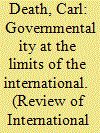

|
|
|
|
|
| Publication |
2013.
|
| Summary/Abstract |
The ability of International Relations theory to 'travel well' to other parts of the world has become one of the central questions within the discipline. This article argues that a Foucauldian-derived 'analytics of government' framework has particular advantages in overcoming some of the difficulties IR theory has faced abroad. These advantages include a methodological focus on specific practices of power at their point of application; attention to similarities between practices of power that cut across perceived binaries such as the domestic and international, and public and private; and an illumination of the ways in which practices of freedom are combined and interrelate with forms of coercion and violence. This argument is illustrated in the context of debates about the applicability of Foucauldian theory to African politics, through examples drawn from Bayart's work on globalisation, the power of development partnerships, and violence and civil war. It argues that deploying governmentality as an analytical framework, rather than seeing it as a specifically neoliberal form of power relation, can not only facilitate the application of IR theory outside Europe and North America but can also help develop a broader perspective on genuinely world politics.
|
|
|
|
|
|
|
|
|
|
|
|
|
|
|
|
| 5 |
ID:
110846
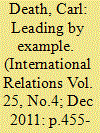

|
|
|
|
|
| Publication |
2011.
|
| Summary/Abstract |
Global environmental politics is emerging as a key field for South African diplomacy and foreign policy, in which Pretoria is endeavouring to lead by example. Environmental summits and conferences such as Johannesburg (2002) and Copenhagen (2009) have been crucial stages for the performance of this role as an environmental leader, and in December 2011 Durban will host the seventeenth Conference of the Parties (COP17) to the United Nations Framework Convention on Climate Change. There are also signs from within policy-making circles that 'the environment' is seen as a field in which some of the lustre of South Africa's post-1994 international high moral standing could be recovered. However, tensions remain between South Africa's performance and rhetoric on the global stage, and domestic development paths which continue to be environmentally unsustainable. The article concludes by suggesting that while the visibility and prominence of South Africa as an actor in global environmental politics is likely to grow, it remains doubtful whether this represents a sustained and committed new direction in South African foreign policy.
|
|
|
|
|
|
|
|
|
|
|
|
|
|
|
|
| 6 |
ID:
099190
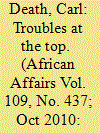

|
|
|
|
|
| Publication |
2010.
|
| Summary/Abstract |
Political protests have visibly increased in frequency and intensity in South Africa in recent years, and they seem to indicate a more adversarial relationship between the post-apartheid state and civil society. This article uses the 2002 Johannesburg World Summit on Sustainable Development, and the protests which accompanied it, to illuminate these broader trends. It analyses the legacy of the Summit as a 'mega-event', and highlights the importance of the 'mega-protests' in 2002. The most important effects are shown to be the disruption of South African extraversion; the marginalization and repression of particular social movements; and the exacerbation of broader trends toward a more polarized political landscape in South Africa. Importantly, however, the article concludes that such developments are not evidence of growing distance between the state and civil society, but rather between those considered legitimate and responsible partners, and those who are excluded from 'normal' politics. Thus the Johannesburg Summit illuminates broader trends toward the governmentalization and transnationalization of politics in South Africa, and destabilizes conventional understandings of what and where 'South African politics' actually is, as well as raising important questions regarding the impacts of such mega-events in the future.
|
|
|
|
|
|
|
|
|
|
|
|
|
|
|
|
|
|
|
|
|